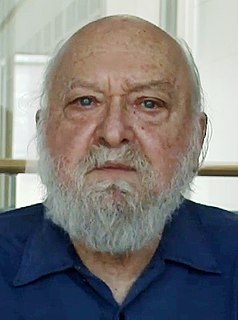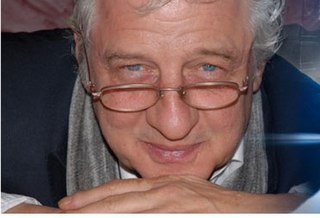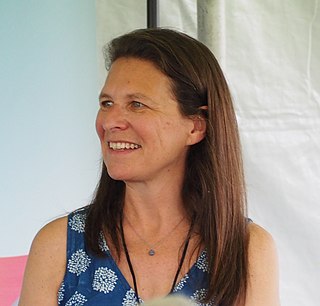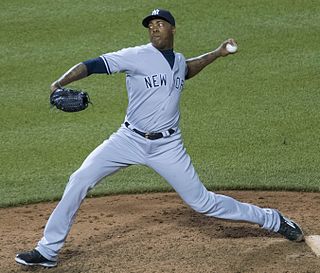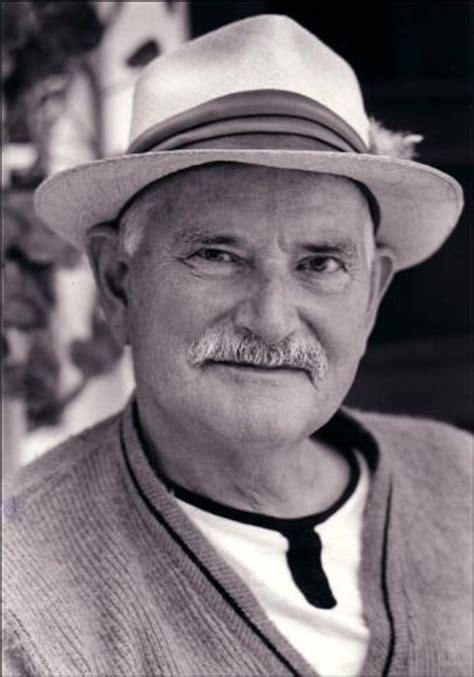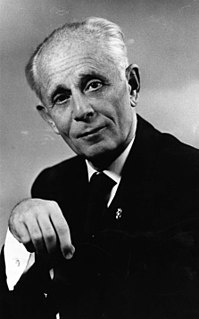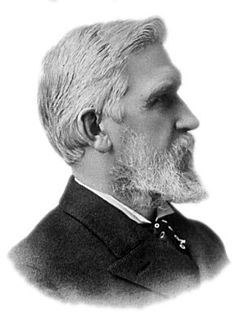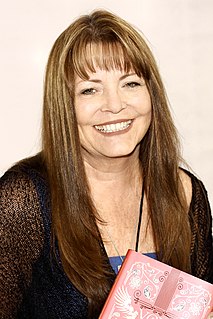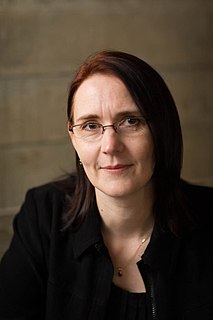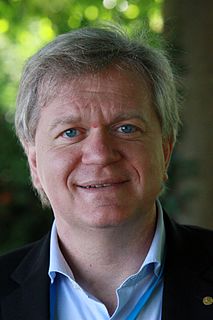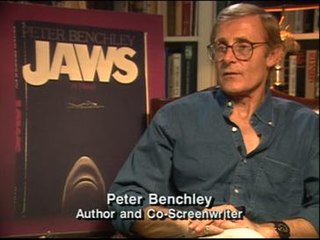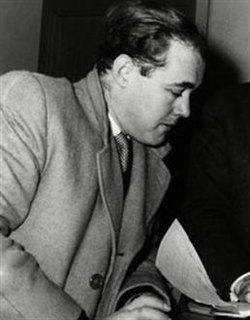Top 1200 Scientist Life Quotes & Sayings - Page 20
Explore popular Scientist Life quotes.
Last updated on December 4, 2024.
It's an experience like no other experience I can describe, the best thing that can happen to a scientist, realizing that something that has happened in his or her mind exactly corresponds to something that happens in nature. One is surprised that a construct of one's own mind can actually be realised in the honest-to-goodness world out there. A great shock, and a great, great joy.
We hackers are a playful bunch; we'll hack anything, including language, if it looks like fun (thus our tropism for puns). Deep down, we like confusing people who are stuffier and less mentally agile than we are, especially when they're bosses. There's a little bit of the mad scientist in all hackers, ready to discombobulate the world and flip authority the finger - especially if we can do it with snazzy special effects.
If you deny yourself access to the child within because you're too serious, you also block your connection to the divine Light and your feminine self. Every creator who's any good uses their feminine side to create with.. Whether a scientist working on a hunch, a painter working on the interplay of colors, or a musician dealing with the juxtaposition of notes and chords.
Those to whom his word was revealed were always alone in some remote place, like Moses. There wasn't anyone else around when Mohammed got the word either. Mormon Joseph Smith and Christian Scientist, Mary Baker Eddy, had exclusive audiences with God. We have to trust them as reporters--and you know how reporters are. They'll do anything for a story.
It's 2013 ... The Time's obituary for Yvonne Brill, renowned rocket scientist, winner of the National Medal of Technology and Innovations, leads with, 'She made a mean beef stroganoff, followed her husband from job to job and took eight years off from work to raise three children. "The world's best mom," her son Matthew said.
I am of the theory that all of our transcendental connections, anything we're drawn to, be it a person, a song, a painting on a wall--they're magnetic. The art is the alloy, so to speak. And our souls are equipped with whatever properties are required to attract that alloy. I'm no scientist so I don't really know what the hell these properties are, but my point is we're drawn to stuff we've already got a connection to. Part of the thing is already inside of us.
If you say, "I'm bursting with joy," a scientist could analyze your skin and find it loaded with neuropeptides that may have antidepressant effects and that may modulate the immune system. If you say, "I feel exhilarated, unbounded, and joyful," and I were to examine your blood, I would find high levels of interleukin and interferon, which are powerful anticancer drugs.
If poets often commit suicide, it is not because their poems are bad but because they are good. Whoever heard of a bad poet committing suicide? The reader is only a little better off. The exhilaration of a good poem lasts twenty minutes, an hour at most. Unlike the scientist, the artist has reentry problems that are frequent and catastrophic.
Let's just say that if these scientist had been using their brilliance for good instead of evil, cars would run off water vapor and leave fresh compost behind them; no one would be hungry; no one would be ill; all buildings would be earthquake-, bomb-, and flood-proof; and the world's entire economy would have collapsed and been replaced by one based on the value of chocolate.
Religion is still parasitic in the interstices of our knowledge which have not yet been filled. Like bed-bugs in the cracks of walls and furniture, miracles lurk in the lacunae of science. The scientist plasters up these cracks in our knowledge; the more militant Rationalist swats the bugs in the open. Both have their proper sphere and they should realize that they are allies.
My father was a world-class scientist and my mother was a prolific painter. I could see that my parents had completely different ways of knowing and understanding the world, and relating to it. My father approached things through scientific inquiry and exploration, while my mother experienced things through her emotions and senses.
What can be more soul shaking than peering through a 100-inch telescope at a distant galaxy, holding a 100-million-year-old fossil or a 500,000-year-old stone tool in one's hand, standing before the immense chasm of space and time that is the Grand Canyon, or listening to a scientist who gazed upon the face of the universe's creation and did not blink?
To say that you can 'have experience,' means, for one thing, that your past plays into and affects your present, and that it defines your capacity for future experience. As a social scientist, you have to control this rather elaborate interplay, to capture what you experience and sort it out; only in this way can you hope to use it to guide and test your reflection, and in the process shape yourself as an intellectual craftsman
My scientist friends have come up with things like 'principles of uncertainty' and dark holes. They're willing to live inside imagined hypotheses and theories. But many religious folks insist on answers that are always true. We love closure, resolution and clarity, while thinking that we are people of 'faith'! How strange that the very word 'faith' has come to mean its exact opposite.
I think creating the clothes is about creating historical images - and that's about more than fashion. It is about the fashion, the photography, what you are doing in the moment. It's what we call in French rechercher, or the search for that thing. So even though fashion is not scientific, I think being a designer is somewhat like being a scientist.
To the scientist, nature is always and merely a 'phenomenon,' not in the sense of being defective in reality, but in the sense of being a spectacle presented to his intelligent observation; whereas the events of history are never mere phenomena, never mere spectacles for contemplation, but things which the historian looks, not at, but through, to discern the thought within them.
Global warming is a false myth and every serious person and scientist says so. It is not fair to refer to the U.N. panel. IPCC is not a scientific institution: it’s a political body, a sort of non-government organization of green flavor. It’s neither a forum of neutral scientists nor a balanced group of scientists. These people are politicized scientists who arrive there with a one-sided opinion and a one-sided assignment.
My advice for people is to love the world they are in, in whatever way makes sense to them. It may be a devotional practice, it may be song or poetry, it may be by gardening, it may be as an activist, scientist, or community leader. The path to restoration extends from our heart to the heart of sentient beings, and that path will be different for every person.
Friedrich Hayek, who died on March 23, 1992 at age 92, was arguably the greatest social scientist of the twentieth century. By the time of his death, his fundamental way of thought had supplanted the system of John Maynard Keynes - his chief intellectual rival of the century - in the battle since the 1930s for the minds of economists and the policies of governments.
I note that warmists are often banging on about the fact that sceptics like Christopher Booker and myself 'only' have arts degrees. But actually that's our strength, not our weakness. Our intellectual training qualifies us better than any scientist - social or natural sciences - for us to understand that this is, au fond, not a scientific debate but a cultural and rhetorical one.
It's absurd and quite tragic the way people have managed to pit science against faith. They aren't in conflict at all - they're long lost dance partners. I don't divide the world up into Christians and other people - we are all human beings, brothers and sisters, and we embrace truth wherever we find it, whether that's in a lab, a field or a cathedral. Because sometimes you need a scientist and sometimes you need a poet.
The fairest thing we can experience is the mysterious. It is the fundamental emotion which stands at the cradle of true science. He who knows it not, and can no longer wonder, no longer feel amazement, is as good as dead. We all had this priceless talent when we were young. But as time goes by, many of us lose it. The true scientist never loses the faculty of amazement. It is the essence of his being.
When the uncultured man sees a stone in the road it tells him no story other than the fact that he sees a stone ... The scientist looking at the same stone perhaps will stop, and with a hammer break it open, when the newly exposed faces of the rock will have written upon them a history that is as real to him as the printed page.
How can you be sure?" "I'm a doctor, Jenna. And a scientist." "Does that make you an authority on everything? What about a soul, Father? When you were so busy implanting all your neural chips, did you think about that? Did you snip my soul from my old body, too? Where did you put it? Show me! Where? Where in all this groundbreaking technology did you insert my soul?
I had two competing ambitions when I was a child: I wanted to be a Scientist and Discover Great Things, but I also wanted to be an Author and Write Great Things. I've always tried to combine the analytical with the creative, to some extent or another, because I find it hard to do one without the other. I've worked as a tech journalist, social media consultant, and now am self-publishing fiction.
I think a scientist's job is to explore the Universe, to explore the cosmos around us. People always want to know - why is that useful? Well, on just pure fundamental grounds, on some level it's like art, it's like umm, music, it's aesthetics, it's like philosophy. You want to know where you are in the Universe.
Sharks have everything a scientist dreams of. They're beautiful?God, how beautiful they are! They're like an impossibly perfect piece of machinery. They're as graceful as any bird. They're as mysterious as any animal on earth. No one knows for sure how long they live or what impulses?except for hunger?they respond to. There are more than two hundred and fifty species of shark, and everyone is different from every other one.
We should know that Allah has created us to live an eternal life with no death, a life of pride and ease with no humiliation, a life of security with no fear, a life of richness with no poverty, a life of joy with no pain, a life of perfection with no flaws. Allah is testing us in this world with a life that will end in death, a life of pride that is accompanied by humiliation and degradation, a life that is tainted by fear, where joy and ease are mixed with sorrow and pain.
It has been a fortunate fact in the modern history of physical science that the scientist constructing a new theoretical system has nearly always found that the mathematics. . . required. . . had already been worked out by pure mathematicians for their own amusement. . . . The moral for statesmen would seem to be that, for proper scientific "planning", pure mathematics should be endowed fifty years ahead of scientists.
1. When a distinguished but elderly scientist states that something is possible, he is almost certainly right. When he states that something is impossible, he is very probably wrong. 2. The only way of discovering the limits of the possible is to venture a little way past them into the impossible. 3. Any sufficiently advanced technology is indistinguishable from magic.
All great human deeds both consume and transform their doers. Consider an athlete, a scientist, an artist, or an entrepreneur. In service of their goals, they lay down time, energy and many other choices and pleasures; in return, they become most truly themselves. A false destiny may be spotted by the fact that it consumes without transforming, without giving back the enlarged self.
Charles Darwin [is my personal favorite Fellow of the Royal Society]. I suppose as a physical scientist I ought to have chosen Newton. He would have won hands down in an IQ test, but if you ask who was the most attractive personality then Darwin is the one you'd wish to meet. Newton was solitary and reclusive, even vain and vindictive in his later years when he was president of the society.
If belief in evolution is a requirement to be a real scientist, it’s interesting to consider a quote from Dr. Marc Kirschner, founding chair of the Department of Systems Biology at Harvard Medical School:
“In fact, over the last 100 years, almost all of biology has proceeded independent of evolution, except evolutionary biology itself. Molecular biology, biochemistry, physiology, have not taken evolution into account at all.
Once you have made peace with the present moment, see what happens, what you can do or choose to do, or rather what life does through you. There are three words that convey the secret of the art of living, the secret of all success and happiness: One With Life. Being one with life is being one with Now. You then realize that you don't live your life, but life lives you. Life is the dancer, and you are the dance.
Everyone is free to set up an opinion and to adduce proofs in support of it. Whether, though, a scientist shall find it worth his while to enter into serious investigations of opinions so advanced is a question which his reason and instinct alone can decide. If these things, in the end, should turn out to be true, I shall not be ashamed of being the last to believe them.
Though the world does not change with a change of paradigm, the scientist afterward works in a different world... I am convinced that we must learn to make sense of statements that at least resemble these. What occurs during a scientific revolution is not fully reducible to a re-interpretation of individual and stable data. In the first place, the data are not unequivocally stable.
The mistake made by all previous systems of ethics has been the failure to recognize that life as such is the mysterious value with which they have to deal. All spiritual life meets us within natural life. Reverence for life, therefore, is applied to natural life and spiritual life alike. In the parable of Jesus, the shepherd saves not merely the soul of the lost sheep but the whole animal. The stronger the reverence for natural life, the stronger grows also that for spiritual life.
Back in 1792, Dr. Benjamin Banneker, the famed African-American inventor and scientist in Washington, proposed a Department of Peace for the new Nation to his friends George Washington and Thomas Jefferson. His prophetic suggestion was not implemented; but now, more than 200 years later, the need for a Peace Department is too compelling to ignore.
There's a great difference between knowing that a thing is so, and knowing how to use that knowledge for the good of mankind. Thetrouble with a scientist is we quickly tire of our discoveries. We hand them over to people who are not ready for them, while we go off again into the darkness of ignorance, searching for other discoveries, which will be mishandled in just the same way when the time comes.

